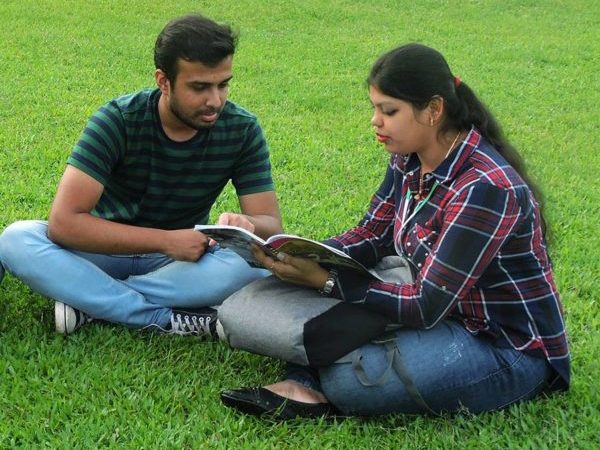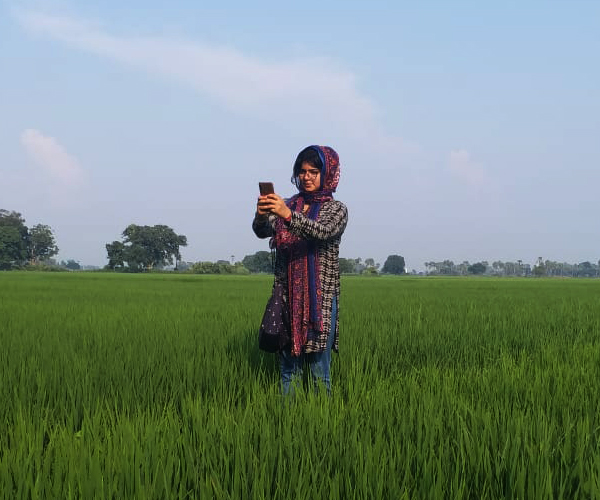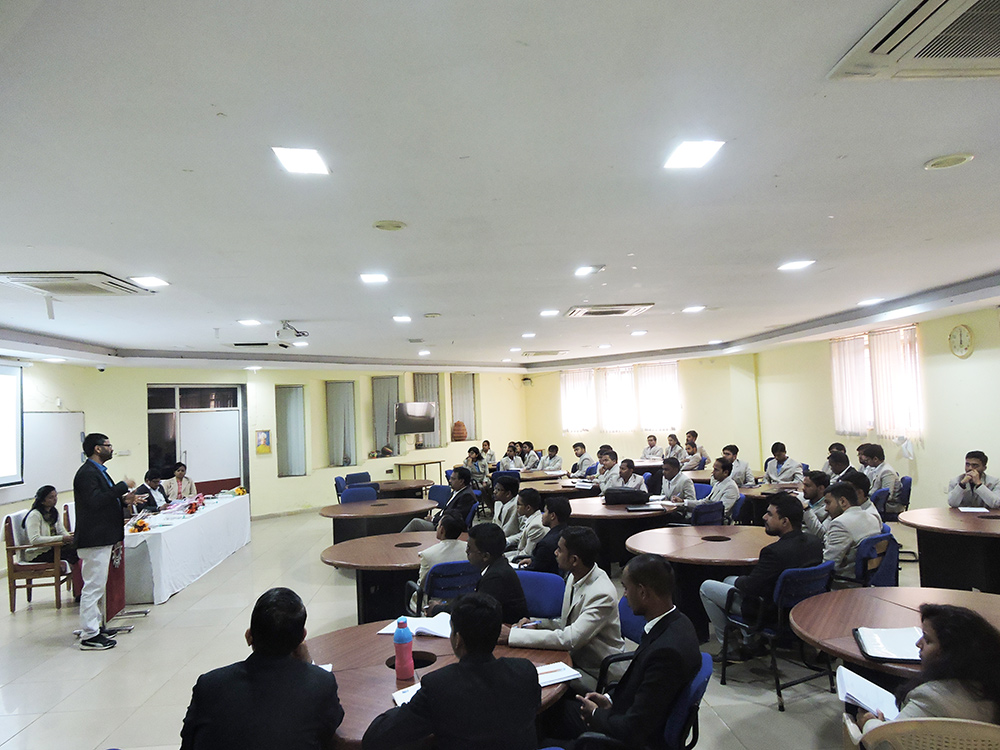MBA (Agribusiness Management)
About the Course:
Agribusiness is one of the major generators of employment in India and worldwide. Agribusiness includes all the activities that take place from the farm to the final consumers. It covers the agri. inputs, production, processing, distribution logistics and marketing all the agricultural products. With liberalisation and globalisation, tremendous amount of opportunities have been created in this sector.
The agribusiness sector in India today lacks the trained and skilled managerial professionals to manage the current challenges and take it to greater heights. With an aim to prepare qualified and well trained professionals to cater to various needs of the agribusiness sector, our school has started a 2 year full time MBA Agribusiness Management programme from the 2019 academic session. The aim of the programme is to provide fundamental and analytical knowledge and the necessary skills to prepare better quality managers to serve the sector to harness its full potential.

Academics:
The curriculum for the programme includes compulsory courses, industry attachment and projects. The students will have to go through a rigorous curriculum which will help them to develop adequate managerial skills appropriate for the agribusiness sector. The programme has 4 semesters and includes an 8 week summer training programme after the completion of the second semester. There are a total of 84 credits in the entire course. Out of these, 10 credits are offered through 2 field segments and 4 credits through live projects and the rest in the form of compulsory classroom courses.
Program Outcomes (POs)

- Apply knowledge of agribusiness and management theories and practices to manage and address agribusiness problems.
- Foster analytical and critical thinking for evidence-based decision making for agricultural issues.
- Ability to comprehend, analyze and communicate global economic, legal and ethical aspects of agriculture management and business.
- Competent to lead themselves and others in the achievement of organizational goals, contributing effectively to a team environment in agribusiness sector.
- Adept in planning, incubating and nurturing innovative agribusiness.
- Prowess to design, implement, monitor and evaluate strategic projects, programmes and policies for agriculture and management.
Programme Design
The curriculum for the programme includes compulsory courses, industry attachment and projects. The students will have to go through a rigorous curriculum which will help them to develop adequate managerial skills appropriate for the agribusiness sector. The programme has 4 semesters and includes an 8 week summer training programme after the completion of the second semester. There are a total of 84 credits in the entire course. Out of these, 10 credits are offered through 2 field segments and 4 credits through live projects and the rest in the form of compulsory classroom courses.
Semester I
- Micro Economic Analysis
- Accounting for Managers
- Rural Production and Livelihoods
- Quantitative Techniques
- Marketing Management
- Development Perspectives
- Managerial Analysis and Communication
- Organizational Behaviour
- Basics of Agriculture for Managers
Rural Immersion Programme
Semester II
- Macro Economic Analysis
- Sales and Distribution Management
- Rural Advertising and Product Management
- Business Research Methods
- Agri-Input Marketing
- Agri-Finance and Commercial Banking
- Procurement and Supply Chain Management
- ICT in Agriculture and E-Business
- Finance Management
- Live Project-I
Summer Internship
Semester III
- Management of Agricultural Value Chain
- Strategic Management
- Project Management
- Management of Co-operatives & FPOs
- Micro Finance
- Agri Warehousing and Collateral Management
- Management of Food Processing Industries
- Emerging Trends and Policies in Agriculture
- Live Project-II
Semester IV
- Commodity Trading and Derivatives
- Legal Environment and Business Ethics
- International Trade in Agriculture
- Agriculture Entrepreneurship Management
- Human Resource Management
- Climate Change and Agriculture
Field Segment
The rural immersion component will give the students a preliminary exposure to rural life and develop an understanding of the realities of the rural people. It will help in developing a perspective on rural sector in general and agriculture sector in particular. The programme will be conducted in partnership with grassroots level NGOs. The students are expected to stay in the villages for the entire duration of two weeks and submit a report at the end of the programme based on their own understanding of the rural life and agriculture sector as an output.
In specific, the students are expected to be involved in the following processes / activities during their stay in the villages: –
- Conduct PRA exercises in the villages to complete Social map, resource map, seasonality of crop production and Agri-based time line for the village.
- List and observe various livelihood options available for people in the village.
- Identify agriculture-based livelihoods (including animal husbandry and fisheries) practiced by the villagers and study the value chain of the particular activity in some detail starting from inputs for the activity to outputs of the activity.
- Study the various Government programmes available for the villagers including crop insurance and study their operational modalities.
- Study the Crop production practices in detail using techniques like focus group discussions with the farmers and also take up a few case studies.
The focus of Summer Internship component is to partner with all our partners and enterprises that have an unstinting commitment to Agribusiness sector. The Summer Internship is planned to be a problem solving segment wherein students will apply their analytical and decision making skills on specific project based problems/challenges assigned by organizations engaged in various aspects of rural business and development.
The students will work under active guidance of experienced senior managers supported by faculty guides from KSRM to help them to make decisions under real & more demanding situations.
Scope of Summer Internship:
The host organizations can assign project(s) on problems/issues/situations which require better understanding, insights and analytical abilities for their resolution.
Summer Internship Deliverables:
During the course of Summer Internship students are expected to rigorously research the problem, analyze data, and produce outputs in terms of solutions in line with the objectives of the projects. After the completion of Summer Internship field work the students are expected to make presentation of their project to host organization and submit the draft reports.
The study findings are again presented in Summer Internship seminars conducted at KSRM under the supervision of internal faculty and external examiner. Based on the suggestions received during the seminars and comments of the faculty guides, the draft reports are revised and a copy each is submitted to school and host organization. The students are evaluated for their projects independently by the host organization and KSRM.
Live Project I
In the arena of ever changing global economy, the prospects and challenges of agriculture sector has been changing. In this context, the students of agri-business management, in the first year of their course, need to have basic understanding on the dynamics of the agriculture sector especially the functioning of industries related to agri-input, credit, production & value addition, commodity trading & collateral, marketing, and farm-based organizations.
With this background, the students in their second semester (after going through the fundamental courses in the first semester) need to have experience of above mentioned industry specific scientific understanding through both secondary and primary information. This experience may enable the students to prepare for their Summer Internship followed by the Live Project-2.
Two-week worth of time across the semester is proposed for the Live Project-1. The students in group (4-5 students in each group) need to take up the pre-defined and identified specific industry related project in the vicinity of the University. Faculty guide will be allocated to the each group. They may visit multiple times to get relevant secondary data and literature (document), observe and discuss with some defined stakeholders.
At the end of the project, the student groups will prepare their report and submit to their respective faculty guide. As part of the evaluation, each group needs to give a formal presentation to the faculty members and their fellow student friends. The purpose of the presentation in front of their fellow student friends is to facilitate cross learning.
Live Project II
The students in their third semester (after going through the fundamental courses and some advanced courses in the first two semesters semester) need to have experience of industry specific scientific understanding through both secondary and primary information. This experience may enable the students to prepare themselves for their placements after having completed their Live Project-1 and Summer Internship.
Two-week worth of time across the semester is proposed for the Live Project-2. The students in group (2 to 3 students in each group) need to take up the pre-defined and identified specific industry related project in the vicinity of the University. Faculty guide will be allocated to the each group. They may visit multiple times to get relevant secondary data and literature (document), observe and discuss with some defined stakeholders.
At the end of the project, the student groups will prepare their report and submit to their respective faculty guide. As part of the evaluation, each group needs to give a formal presentation to the faculty members and their fellow student friends. The purpose of the presentation in front of their fellow student friends is to facilitate cross learning.
Outcomes from the Live Projects 2: After completing the second live project, the students should be able to –
- Understand the working of an Agri-business Organisation.
- Would have interacted with some customers of the business or the organization and would have a glimpse of the expectations of the customers.
- Understand the day to day challenges of running the particular business and understand how those are generally dealt with.
- Learn the skills of communicating with employees within the organisations and their customers.
Placements opportunities
The course will have direct relevance to the following sectors and sub sectors:

Agri. Input Industry
- Seeds
- Fertiliser
- Agrochemicals
- Farm machinery and Equipments
- Feed
- Cattle Feed
- Poultry Feed
- Aqua Feed
Food Processing Industry
- Dairy
- Fruit and Vegetable processing
- Chicken & Meat Processing
Retail Industry
Development Sector
Cooperatives and FPOs
E-Commerce
Financial Services
- Private Sector Banks
- Public Sector Banks
- Small Finance Banks
- NBFCs working in Agri. and Rural Sector
- Micro Finance Institutions
Agri. Commodity Trading Sector
Agri. Warehousing Sector
Agri. Export Houses

